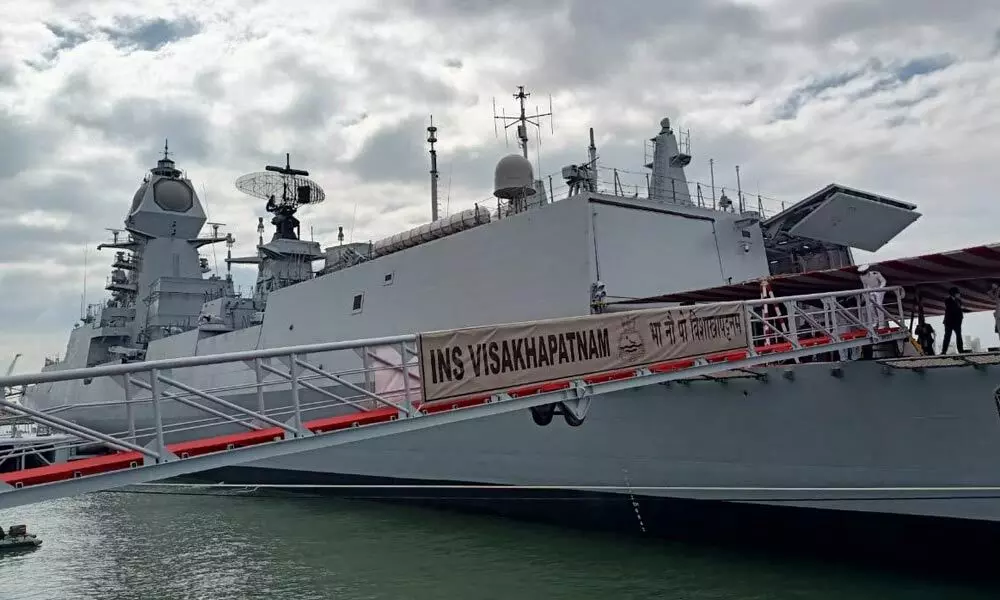Safeguarding country's economic interests

Safeguarding country’s economic interests
Dependence of the world in general and India in particular on maritime trade has never been greater
Towards the end of last year, the Indian Navy inducted two 'potent' indigenously built platforms – INS Visakhapatnam and INS Vela. Speaking during the induction ceremony at Visakhapatnam on November 21, 2021, Defence Minister Rajnath Singh underlined the Navy's role in ensuring a safe and open Indo-Pacific and thus safeguarding the country's economic interests.
What is it that the Navy does, which makes it the preferred instrument in safeguarding the nation's as well as the world's economic aspirations? Maritime trade and commerce are economic activities, which need a safe and conducive environment to thrive. It is this requirement, which led to development of navies. The Cholas had a powerful navy up until the 13th century, which allowed them to trade and establish their influence right up to Southeast Asia.
The imperialistic designs of European powers remained in check till the time there was a credible navy guarding the Indian shores. The decline of Maratha naval power in the mid-18th century allowed the European powers, particularly the British to flex their muscles. The presence of capable naval forces had allowed us to flourish and the 'sea blindness' resulting in weakening of naval power led to the ultimate conquest, downfall and exploitation of the Indian subcontinent.
To put it simply, the dependence of the world in general and India in particular on maritime trade has never been greater. A total 95 per cent of all Indian trade by volume or 70 per cent by value is handled through the maritime route.
To further put it more clearly, about 80 per cent of the fuel that we fill in our vehicles at petrol pumps is brought into the country via the sea route. Similarly, be it a smartphone, a television or a computer, almost all the semiconductor chips inbuilt devices and components such as batteries, display components are imported into the country through sea.
To understand the importance of maritime trade a little better, let's look at what happened in the Suez Canal on March 23, 2021. MV Ever Given, a 400-metre long container carrier, loaded with 17,000 containers ran aground for six full days in the world's most busy waterway. The blockage of Suez Canal during the period sent shock waves throughout the world. The Suez carries 12 per cent of the entire world's sea trade.
It would be interesting to note that the entire loss caused to world maritime trade due to this single incident can perhaps never be quantified accurately because the after-effects of this incident may still be catching up with some individuals and agencies. Such is the depth of the extent of dependence on maritime trade on our individual lives.
While the Ever Given incident may have happened due to human error, the possibility of such an incident happening in other busy constricted waterways by way of deliberate military action or a pre meditated terror attack remains a grim possibility.
As the nation progresses towards becoming a global production hub, it needs more and more sea trade to bring in raw materials, oil and petroleum and take out finished products to their destinations worldwide, thereby ushering in employment, growth and prosperity. Such a vast and diverse sea trade requires protection against traditional and non-traditional threats. As history shows us, such protection can be provided only by a capable and a professional navy.
The Indian Navy is mandated to ensure safety of the nation's maritime trade through protection of Sea Lines of Communication (SLOCs). This remains the Indian Navy's primary military mission. The mission is achieved by ensuring that the SLOCs are monitored and patrolled by the naval ships and aircraft. While protection of trade remains a continuous and omnipresent mission for the Indian Navy, protection of country's vast coastline, offshore development areas and island territories -- which are far from the mainland is also a crucial mission.
Just as the Indian Army and the Border Security Force are responsible to ensure that country's land borders with neighbouring countries are well guarded and protected from external attacks, the Indian Navy take continuous measures to ensure that anti-national elements as well as drug traffickers do not infiltrate into our country through the sea route.
The missions and deployments of the assets of the Indian Navy are aimed to ensure that the conducive conditions are created on the high seas as well as coastal waters to further guarantee that the ic progress of the nation remains unhindered.
So, the next time you see a large sophisticated windmill churning away silently or a solar power panel on top of your house, remember that there are ships and aircraft of the Indian Navy on 24x7 patrol, ensuring that the ships that are carrying these vital cargo proceed to their destinations unharmed to bring about prosperity and realise the dream of Aatma Nirbhar Bharat (Self-Reliant India).








